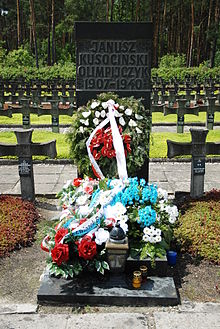Janusz Kusociński
Janusz Tadeusz Kusociński (born January 15, 1907 in Warsaw , † June 21, 1940 in Palmiry near Warsaw; nickname Kusy ) was a Polish athlete and Olympic champion in 1932 over 10,000 meters . He was murdered by the German occupiers as part of the AB action during World War II .
Life
Kusociński was born into a family of railroad workers. As a schoolboy he played football in various Warsaw clubs . It was not until 1928 that he started athletics after he had joined the “Sarmata” club. There he was trained by the Estonian decathlete Aleksander Klumberg-Kolmpere , who won the bronze medal at the Olympic Games in Paris in 1924 .
On his first participation in the Polish national championships, Kusociński surprisingly won the title over 5000 meters and in the cross-country run. Because of his conscription to the Polish army, he had to interrupt his sporting career for one season. His performance after that was better than before. In 1930 and 1931 he was Polish champion over 1500 meters , 5000 meters and cross-country running . In 1932 he won the 800 meter title .
One month before the start of the 1932 Olympic Games in Los Angeles , Kusociński ran a new world record over 3000 meters with 8: 18.8 minutes . At the Olympic Games he competed over 10,000 meters . After an exciting fight with the Finnish runners Volmari Iso-Hollo and Lasse Virtanen , Kusociński became Olympic champion in the new world annual best of 30: 11.4 min. In the same year he also improved the world record over 4 miles to 19: 02.6 min.
After winning the silver medal over 5000 meters at the European Championships , which were held for the first time in Turin in 1934 , Kusociński retired from active competitive sports. In 1939 he made his comeback and became the Polish national champion in the 10,000 meter run.
After the German Wehrmacht invaded Poland , Kusociński volunteered for the Polish army . He was an infantry - Company allocated in the battle for Warsaw , he was wounded twice. During the German occupation he worked as a waiter , but he was also active in the underground organization Organizacja Wojskowa Wilki ("Military Organization Wolves"). He was arrested by the Gestapo on March 26, 1940, and was severely tortured while in custody. Three months after his arrest, he was murdered in Palmiry with other victims of the AB operation .
Commemoration
Since 1954, an international athletics festival, the “Kusociński Memorial”, has been held in his honor in Warsaw. An outstanding event was a discus world record by Edmund Piątkowski in 1959 .
In 1971 the Kusocińskidamm in the Munich Olympic Park , between Georg-Brauchle-Ring and Riesstrasse, was named after him in his honor.
Movie
In 1977 Krzysztof Rogulski made the film Last Round about Kusociński.
literature
- Lesław M. Bartelski: Janusz Kusociński . Warsaw 1979.
- Radosław Nawrot / Rafał Szłapa: Janusz Kusociński - bieg aż do krwi . Warsaw 2008 (comic)
- Stefan Wiederkehr: Janusz Kusociński. From Olympic champion to resistance fighter , in: Diethelm Blecking , Lorenz Peiffer (ed.) Athletes in the "Century of Camps". Profiteers, resistors and victims. Göttingen: Die Werkstatt, 2012, pp. 201–205.
Web links
- Janusz Kusociński in the Sports-Reference database (English; archived from the original )
Individual evidence
- ↑ Kusociński - wielka gwiazda sportu, wielki patriota. In: Instytut Pileckiego. Retrieved March 22, 2019 (pl-PL).
- ↑ Andrzej Jucewicz / Włodzimierz Stępiński: Chwała olimpijczykom 1939-1945 . Warsaw 1968, pp. 40-48.
- ^ Stefan Wiederkehr, Janusz Kusociński. From Olympic champion to resistance fighter, in: Athletes in the 'Century of the Camps'. Profiteers, resistors and victims . Edited by Diethelm Blecking / Lorenz Peiffer. Göttingen 2013, pp. 203–205.
- ↑ see http://www.iaaf.org/WAF09/news/kind=100/newsid=50982.html ( Memento from June 10, 2009 in the Internet Archive ) IAAF
| personal data | |
|---|---|
| SURNAME | Kusociński, Janusz |
| ALTERNATIVE NAMES | Kusy; Kusociński, Janusz Tadeusz (full name) |
| BRIEF DESCRIPTION | Polish athlete |
| DATE OF BIRTH | January 15, 1907 |
| PLACE OF BIRTH | Warsaw |
| DATE OF DEATH | June 21, 1940 |
| Place of death | Palmiry |

